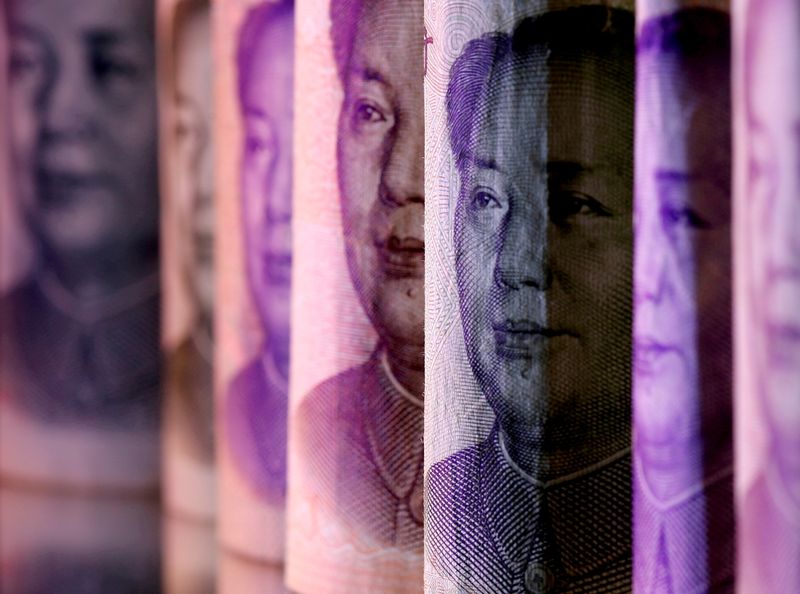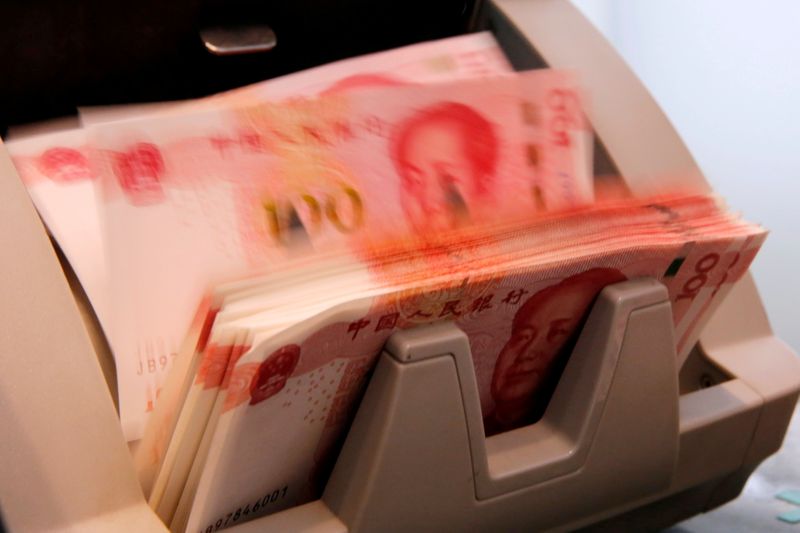By Marc Jones
LONDON (Reuters) -The Chinese yuan is on course to become a much more influential part of the global financial system with almost a third of central banks planning to add the currency to their reserve assets, a closely followed survey showed on Wednesday.
The Global Public Investor survey, published annually by the London-based OMFIF think tank, showed 30% of central banks plan to increase yuan holdings over the next 12-24 months, compared with just 10% last year.
It comes despite the differences between Western governments and China on the global stage. The yuan's rise will almost certainly be a global trend, but may be especially strong in Africa where almost half of central banks are planning to increase their yuan reserves.
Other eye-catching findings showed that 75% of central banks now thought monetary policy was having excessive influence on financial markets, although only 40% thought these policies needed to be actively reconsidered.
In stark contrast to the yuan, 20% of central banks plan to reduce their holdings of the U.S. dollar over the next 12-24 months and 18% plan to reduce their euro holdings.
Some 14% also want to cut their holdings of euro zone sovereign debt in what could be interpreted as a response to the European Central Bank's deeply negative interest rates.
The report also showed that only 59% of central banks would be willing to use more than 30% of their reserves in the event of a serious currency shock, while 45% of pension funds now invested in gold, well up from 30% in last year's survey.
It estimated that central banks, sovereign wealth funds and public pension funds control a record $42.7 trillion worth of assets. Central bank reserves alone rose $1.3 trillion last year to new high of $15.3 trillion.
The report also showed the dramatic impact COVID-19 and the lower-for-longer interest rate outlook was having.
Trends in diversification – to boost or maintain returns, or to incorporate a more sustainable investment approach – are accelerating.
SUSTAINABILITY
In their search for yield, close to 30% of global public investors - central banks, sovereign wealth funds and public pension funds - will reduce their exposure to developed market sovereign bonds, while more than 20% plan to buy more emerging market government debt.
Just over a quarter of central banks also plan to expand their corporate bond holdings and 21% will increase their allocations towards equities.
It is likely to add to the concerns the central banks themselves have that experimental monetary policy, such as negative interest rates and mass stimulus programmes, are exerting excessive influence on financial markets.
"The way central banks are intervening in the market produces substantial changes to the prices of some assets and can lead to financial bubbles," one unidentified central bank respondent cited in the report said.
GPIs are also increasing demand for sustainable assets and becoming more active investors. Some 92% of central banks invest in green bonds and 21% already in sustainable equities. Around 65% of central banks plan to add to their green bond holdings, up from 45% last year.
One in 10 central banks also said that sustainability was now their joint-most important institutional priority, although 50% still did not explicitly implement environmental, social and governance considerations in their portfolios.

"There has definitely been an acceleration (towards ESG) due to COVID," OMFIF's Chief Economist Danae Kyriakopoulou told Reuters.
"At the beginning (of the pandemic), we thought there would be a focus on the short-term, the quick boosts to recoveries. But actually there has been this realisation that our financial systems are so vulnerable to things outside the financial world"
